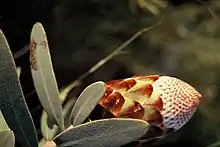Protea inopina
Protea inopina, the large-nut sugarbush, is a flowering shrub belonging to the well-known Protea genus. The plant is endemic to the Western Cape, rare, extremely isolated and occurs only in the Olifants River mountains near Palace Hill.[2]
| Protea inopina | |
|---|---|
 | |
| Scientific classification | |
| Kingdom: | Plantae |
| Clade: | Tracheophytes |
| Clade: | Angiosperms |
| Clade: | Eudicots |
| Order: | Proteales |
| Family: | Proteaceae |
| Genus: | Protea |
| Species: | P. inopina |
| Binomial name | |
| Protea inopina Rourke | |
Description
The plant grows 1 m tall and has many stems. It blooms from September to December. The plant sprouts again after it has burned. The seeds are stored in a shell and spread by the wind. The plant is unisexual. Pollination takes place through the action of birds.[3] The plant grows in sandstone soil at altitudes of 600 - 650 m.[4]
See also
References
- Rebelo, A.G.; Raimondo, D.; von Staden, L. (2020). "Protea inopina". IUCN Red List of Threatened Species. IUCN. 2020: e.T113210115A185591877. doi:10.2305/IUCN.UK.2020-3.RLTS.T113210115A185591877.en.
- "Threatened Species Programme | SANBI Red List of South African Plants". redlist.sanbi.org.
- "Protea inopina | PlantZAfrica". pza.sanbi.org. Retrieved 5 December 2021.
- "Shaving-brush Sugarbushes". www.proteaatlas.org.za. Retrieved 5 December 2021.
![]() Media related to Protea inopina at Wikimedia Commons
Media related to Protea inopina at Wikimedia Commons
This article is issued from Wikipedia. The text is licensed under Creative Commons - Attribution - Sharealike. Additional terms may apply for the media files.
